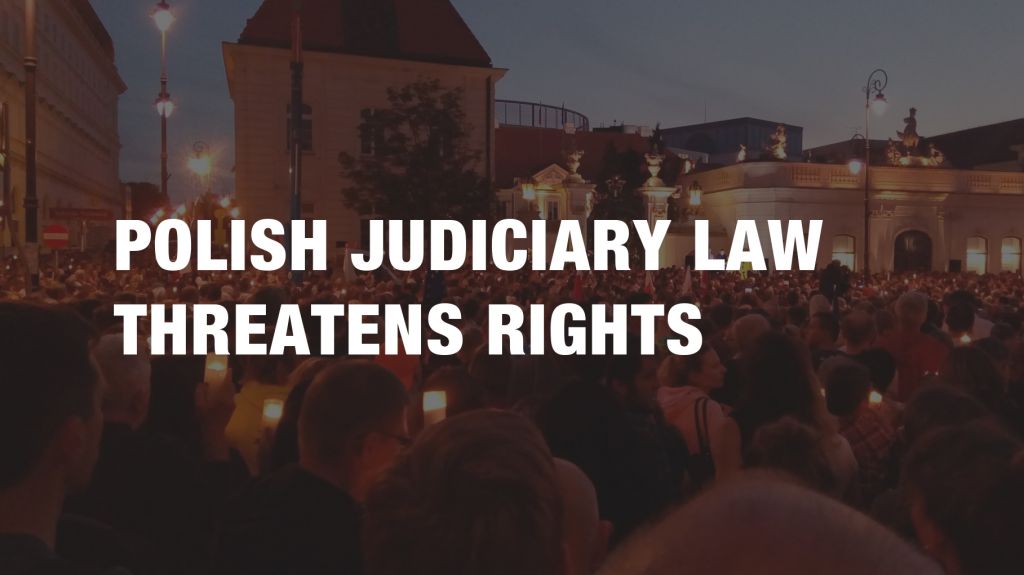Andrzej Duda announced that he will veto the law of the Supreme Court and the National Court Register.
This follows days of protests, the #CandleLightRevolution, in the streets of Warsaw since the Parliament passed the laws.
Some 52 civil society organisations called on the President to veto the acts undermining judicial power in Poland, in an open letter on 22 July.
They wrote: “The fate of the right to a fair trial by an independent court for everybody under the jurisdiction of the Republic of Poland depends on you.”
The Polish Senat, the upper House of parliament, adopted the new law on the Supreme Court on 21 July, after approval by the Sejm, the lower House on 20 July. It was then directed to the President.
—
Published 19 July
The Polish parliament (Sejm) is set to vote on controversial amendments that would effectively terminate the independence of the country’s Supreme Court, according to human rights organisations and legal experts.
The steps taken by the Sejm would diminish the Court’s ability to act effectively as the last legal remedy in the country, and “will lead to a situation when the basic human right to a fair trial by an impartial court becomes illusory,” according to a joint statement by the Helsinki Foundation for Human Rights and the Helsinki Committee in Poland, two key human rights voices in the country.
On 18 July, large protests against the proposed law spread throughout the country, reminiscent of the black (czarny) protests which took place in the autumn of 2016 when the Sejm attempted to introduce an absolute ban on abortion.
“The termination of tenures of all the Court’s judges and granting the Minister of Justice a competence to single-handedly decide which judges will remain in the office in this most important Polish court is tantamount to the revocation of the Supreme Court’s independence,” stated the Helsinki Foundation for Human Rights and the Helsinki Committee.
The Sejm is set to vote on the amendments to the law on the Supreme Court on 20 July 2017. Proposed by the parliamentarians of the governing majority, the amendments show the tension in Poland amid a willingness to undermine the independence of the judiciary, weaken checks and balances, and threaten the rule of law and respect for fundamental freedoms.
“Such a solution is applied only by the governments of authoritarian states,” continued the Helsinki Foundation for Human Rights and the Helsinki Committee.
Prior to introducing amendments to the law on the Supreme Court, the Sejm changed the regulations of the National Council of the Judiciary – the body with inter alia powers to appoint judges to the Court – enabling the parliament to appoint the members of the Council and foreseeing that the appointment of a new judge will not be possible without the consent of the representatives of government, parliament and President appointed to and sitting in the Council.
On 19 July, Poland’s Commissioner for Human Rights, Adam Bodnar, stated that the purpose of the legislative changes was “to subordinate the courts to political power,” and that this “explains the surprise moves, the rapid pace of proceedings and the complete lack of willingness to engage in discussion.”
This reaction came after the Secretary General of the Council of Europe wrote to the Speaker of the Sejm, Marek Kuchciński, raising alarm at the new law on the Supreme Court, and underlining that the “draft law should be taken in conjunction with other texts adopted recently in Poland on the judiciary, which also raise concerns, such as the draft law on the National Council for the Judiciary.”
“If you look back, you can see that Poland’s human rights situation has been challenged by a variety of bodies, which we have briefed with the Helsinki Foundation, from the Venice Commission to the UN Human Rights Committee and the European Commission. Poland’s latest review at the United Nations is something of a climax of a cycle of reviews that have been very critical of changes happening in the country,” commented Florian Irminger, HRHF’s Head of Advocacy in May 2017, following the review of Poland at the United Nations and a discussion of the country situation at the General Affairs Council of the European Union.
Since November 2015, following the election of the current government majority in October 2015 and the presidential election of May 2015, Poland is going through a constitutional crisis. This began with changes to the functioning of the Constitutional Court, a law granting government control over TV and radio, a law granting additional powers of surveillance, and the merging of the functions of the Justice Minister and the formerly independent Prosecutor General. International mechanisms have reacted negatively to the steps taken by the Polish government, including the independent United Nations Human Rights Committee in November 2016.
Documents:
-
- Call for Polish President to veto acts undermining judicial power
In an open letter to the President, 52 civil society organisations call on him to veto the acts undermining judicial power in Poland.
- Council of Europe SG letter to speaker of the Sejm
- Helsinki Foundation for Human Rights and Helsinki Committee in Poland joint statement
- Call for Polish President to veto acts undermining judicial power
More on Poland
(French language) Radio interview with Florian Irminger

Listen to an interview (in French) with Florian Irminger, HRHF’s Head of Advocacy, on Swiss public radio on the developments in Poland and Hungary, and the action the European Union is taking.





